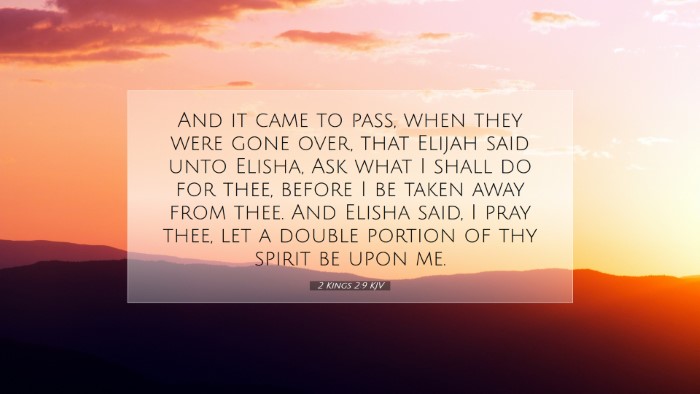Commentary on 2 Kings 2:9
Verse: "And so it was, when they had crossed over, that Elijah said to Elisha, 'Ask what I shall do for you before I am taken away from you.' Elisha said, 'Please let a double portion of your spirit be upon me.'" (2 Kings 2:9, NKJV)
Introduction
This pivotal moment in the narrative of 2 Kings marks a significant transition in prophetic ministry from Elijah to Elisha. The request from Elisha for a double portion of Elijah's spirit opens up a profound exploration of legacy, ministry, and the heart of discipleship. Understanding this verse through the insights of various public domain commentaries enriches our appreciation for the scriptural text.
Historical Context
The events in this verse occur shortly before the dramatic ascension of Elijah into heaven, a transition that signifies not only the end of Elijah's earthly ministry but also the beginning of Elisha's prophetic calling. This historical backdrop is crucial for understanding the urgency and weight of Elisha's request, reflecting the deep relationship between mentor and mentee.
Elijah's Question
Commentary Insight: Matthew Henry emphasizes the intimate nature of Elijah's inquiry to Elisha: "Elijah addresses Elisha with an openness that reflects the deep trust and relationship they have built." This opportunity for Elisha to ask for anything serves as a moment of preparation, underscoring the gravity of the prophetic role awaiting him.
Elisha's Request
Desire for a Double Portion: Elisha's request for a "double portion" encapsulates his understanding of the responsibilities that lie ahead. Albert Barnes notes, "Elisha was not looking for material wealth or earthly authority but was seeking the empowerment necessary for his prophetic duties." This concept of a "double portion" alludes to the biblical principle of inheritance, particularly that which is bestowed upon the firstborn, signifying Elisha's earnest desire to inherit Elijah's prophetic ministry fully.
Spiritual Heritage
Elisha's desire to possess a double portion of Elijah's spirit represents a craving for spiritual heritage—a legacy of prophetic insight and the empowerment needed to fulfill God’s calling. Adam Clarke elaborates, "The 'spirit' here signifies not merely Elijah's personality but the divine empowerment and anointing that equipped him for his task." This highlights the essential nature of spiritual inheritance in ministry, where one generation imparts its blessings to the next.
The Nature of the Spirit
The reference to receiving a "spirit" denotes more than mere emotional qualities; it signifies a deep connection to the Divine. Matthew Henry comments on this aspect by stating, "The Spirit of God, which inspired Elijah, is the same Spirit whom Elisha desires to receive in abundance." This theological insight invites pastors and theologians to reflect on the continuous need for the Spirit's presence and anointing in ministry.
Role of the Holy Spirit
The Holy Spirit as a Source of Power: The Holy Spirit is portrayed as an essential source of power and strength throughout the biblical narrative. This request by Elisha is a recognition that effective ministry cannot be undertaken without the direct influence of the Holy Spirit. Albert Barnes points out, "True success in ministry is contingent upon reliance on the Holy Spirit to lead and empower." This serves as a crucial reminder for every believer, especially those in leadership roles.
Elisha's Faith and Ambition
Elisha’s request is not only audacious but a testament to his faith. He did not ask for trivial things but for a significant empowerment that would enable him to carry on Elijah's work. Adam Clarke observes, "Elisha demonstrated a boldness in his request that speaks to his understanding of the weight of his calling." This faith-filled ambition serves as an encouragement for all believers to seek greater anointing and empowerment for their God-given purposes.
Conclusion
2 Kings 2:9 reveals deep theological insights about mentorship, the nature of spiritual inheritance, the role of the Holy Spirit, and the earnest ambition of those called to prophetic ministry. As we reflect on Elijah’s parting words and Elisha’s profound request, we are reminded of the importance of seeking the Spirit’s empowerment in all aspects of our ministry and life. This passage stands as a lasting encouragement for pastors, students, and theologians, calling them to seek and receive a greater measure of the Spirit for the tasks ahead.


